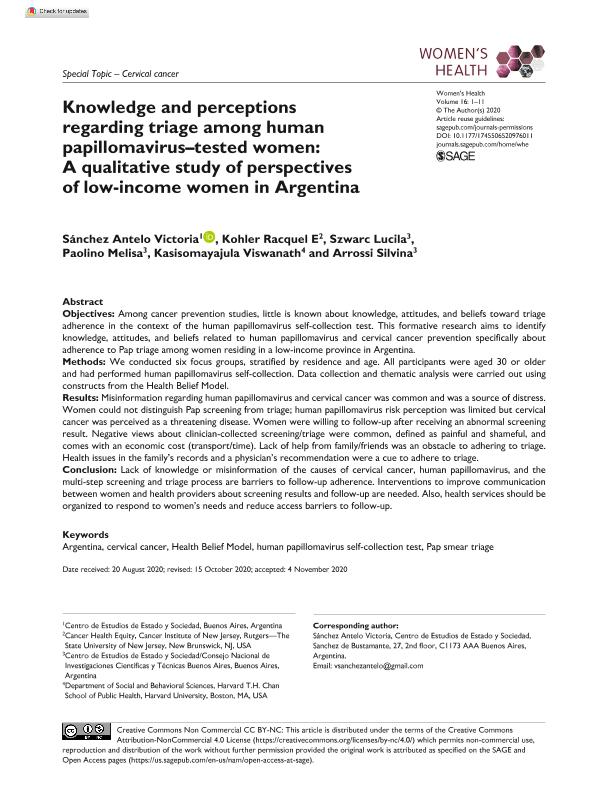Mostrar el registro sencillo del ítem
dc.contributor.author
Sánchez Antelo, Victoria Inés María

dc.contributor.author
Kohler, Racquel

dc.contributor.author
Szwarc, Lucila

dc.contributor.author
Paolino, Melisa Delia

dc.contributor.author
Viswanath, Kasisomayajula

dc.contributor.author
Arrossi, Silvina

dc.date.available
2022-10-17T12:01:24Z
dc.date.issued
2020-12
dc.identifier.citation
Sánchez Antelo, Victoria Inés María; Kohler, Racquel; Szwarc, Lucila; Paolino, Melisa Delia; Viswanath, Kasisomayajula; et al.; Knowledge and perceptions regarding triage among human papillomavirus–tested women: A qualitative study of perspectives of low-income women in Argentina; Sage Publications Ltd; Women's Health; 16; 12-2020; 1-11
dc.identifier.issn
1745-5057
dc.identifier.uri
http://hdl.handle.net/11336/173420
dc.description.abstract
Objectives: Among cancer prevention studies, little is known about knowledge, attitudes, and beliefs toward triage adherence in the context of the human papillomavirus self-collection test. This formative research aims to identify knowledge, attitudes, and beliefs related to human papillomavirus and cervical cancer prevention specifically about adherence to Pap triage among women residing in a low-income province in Argentina. Methods: We conducted six focus groups, stratified by residence and age. All participants were aged 30 or older and had performed human papillomavirus self-collection. Data collection and thematic analysis were carried out using constructs from the Health Belief Model. Results: Misinformation regarding human papillomavirus and cervical cancer was common and was a source of distress. Women could not distinguish Pap screening from triage; human papillomavirus risk perception was limited but cervical cancer was perceived as a threatening disease. Women were willing to follow-up after receiving an abnormal screening result. Negative views about clinician-collected screening/triage were common, defined as painful and shameful, and comes with an economic cost (transport/time). Lack of help from family/friends was an obstacle to adhering to triage. Health issues in the family’s records and a physician’s recommendation were a cue to adhere to triage. Conclusion: Lack of knowledge or misinformation of the causes of cervical cancer, human papillomavirus, and the multi-step screening and triage process are barriers to follow-up adherence. Interventions to improve communication between women and health providers about screening results and follow-up are needed. Also, health services should be organized to respond to women’s needs and reduce access barriers to follow-up.
dc.format
application/pdf
dc.language.iso
eng
dc.publisher
Sage Publications Ltd

dc.rights
info:eu-repo/semantics/openAccess
dc.rights.uri
https://creativecommons.org/licenses/by-nc/2.5/ar/
dc.subject
ARGENTINA
dc.subject
CERVICAL CANCER
dc.subject
HEALTH BELIEF MODEL
dc.subject
HUMAN PAPILLOMAVIRUS SELF-COLLECTION TEST
dc.subject
PAP SMEAR TRIAGE
dc.subject.classification
Otras Sociología

dc.subject.classification
Sociología

dc.subject.classification
CIENCIAS SOCIALES

dc.title
Knowledge and perceptions regarding triage among human papillomavirus–tested women: A qualitative study of perspectives of low-income women in Argentina
dc.type
info:eu-repo/semantics/article
dc.type
info:ar-repo/semantics/artículo
dc.type
info:eu-repo/semantics/publishedVersion
dc.date.updated
2022-10-11T19:35:12Z
dc.identifier.eissn
1745-5065
dc.journal.volume
16
dc.journal.pagination
1-11
dc.journal.pais
Reino Unido

dc.journal.ciudad
Londres
dc.description.fil
Fil: Sánchez Antelo, Victoria Inés María. Consejo Nacional de Investigaciones Científicas y Técnicas; Argentina. Centro de Estudios de Estado y Sociedad; Argentina
dc.description.fil
Fil: Kohler, Racquel. State University of New Jersey; Estados Unidos
dc.description.fil
Fil: Szwarc, Lucila. Consejo Nacional de Investigaciones Científicas y Técnicas; Argentina. Centro de Estudios de Estado y Sociedad; Argentina
dc.description.fil
Fil: Paolino, Melisa Delia. Consejo Nacional de Investigaciones Científicas y Técnicas; Argentina. Centro de Estudios de Estado y Sociedad; Argentina
dc.description.fil
Fil: Viswanath, Kasisomayajula. Harvard University. Harvard School of Public Health; Estados Unidos
dc.description.fil
Fil: Arrossi, Silvina. Consejo Nacional de Investigaciones Científicas y Técnicas; Argentina. Centro de Estudios de Estado y Sociedad; Argentina
dc.journal.title
Women's Health
dc.relation.alternativeid
info:eu-repo/semantics/altIdentifier/url/https://journals.sagepub.com/doi/10.1177/1745506520976011
dc.relation.alternativeid
info:eu-repo/semantics/altIdentifier/doi/https://doi.org/10.1177/1745506520976011
Archivos asociados
